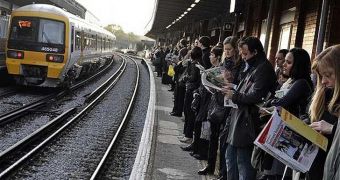A British commuter who is believed to have dodged nearly £43,000 ($76,000 or €55,000) in train fares by exploiting a card loophole for over five years has managed to avoid prosecution after he offered to pay back the entire sum.
The man, described as a hedge fund manager, regularly traveled from a rural station in East Sussex to London using an Oyster Travelcard, but instead of paying £21.50 ($35.95 or €25.99) for his 1 hour 22 minute journey, he only paid £7.20 ($12.04 or €8.70) by exploiting a loophole in the Oyster card system.
This was possible because the man was taking the commuter train from Stonegate – a rural station with no barriers – to London Bridge, where he would catch another train to Cannon Street. For the first part of the journey, the unnamed man didn't purchase a ticket, and he used his Oyster card only at Cannon Street.
Interestingly enough, he also managed to avoid ticket inspectors on the train for five years. He is now believed to be the biggest fare dodger in history.
However, the man was eventually caught in November last year, when a Southeastern Railways ticket inspector met him at the Cannon Street barriers.
Southeastern's investigators discovered his scheme when he renewed his season ticket for the first time since it expired in 2008. This led them to believe he had been evading the fare for five years.
Although he never admitted to paying only a third of the actual cost of his journey from 2008 until the end of last year, the executive offered to settle the matter out of court, and paid back the £42,550 ($71,140/€51,470) in dodged fares and £450 ($752/€543) legal cost in just three days after being caught.
Obviously, there were voices that criticized the train company's decision to reach a settlement, questioning why he was allowed to avoid being prosecuted and remain anonymous.
“There seems to be one law for the rich and one law for the poor when it comes to criminal prosecution. The rich seem to be able to walk away and claim secrecy while the poor get hauled up in front of the local magistrates court and publicly ridiculed,” said Manuel Cortes, leader of the TSSA union which represents railway workers, according to The Guardian.
On the other hand, Southeastern defended their actions saying that all passengers can avoid prosecution and settle out of court, and explained that they decided to keep his identity a secret due to the impact the incident would have had on his job.

 14 DAY TRIAL //
14 DAY TRIAL //